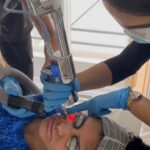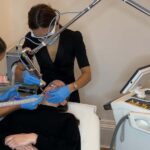
Why Choose A Consultant Dermatologist-Led Service?
When it comes to managing skin issues, from common concerns to complex conditions, there is simply no substitute for the expertise of a consultant dermatologist. With years of rigorous training, specialized knowledge, and clinical experience, these professionals are uniquely equipped to provide comprehensive care that encompasses both health and disease management. Let’s delve into why entrusting your skin to a consultant dermatologist is a safe and wise choice.
Unmatched Training and Qualifications:
Consultant dermatologists undergo extensive training and education to earn their qualifications. After completing medical school, consultant dermatologists first spend many years as a junior doctor across multiple medical specialities in the UK to improve their basic skill set. After passing rigorous postgraduate exams, they will then apply for higher specialist dermatology training which is highly competitive and sought after. If successful, they will then receive hands-on experience in diagnosing and treating a wide range of skin conditions under the guidance of experienced mentors. Following several years in registrar training and more exams, they are awarded the prestigious title of “consultant”. Consultant dermatologists then continue to refine their skills through ongoing professional development and training, ensuring that they remain at the forefront of dermatological care.
Comprehensive Understanding of Skin Health:

Expertise in Cosmetic Dermatology:
In addition to medical dermatology, some consultant dermatologists will subspecialise and are skilled in cosmetic procedures aimed at enhancing skin appearance and addressing signs of aging. They have a deep understanding of skin anatomy and biology, allowing them to perform cosmetic procedures safely and effectively. Whether it’s administering injectables, performing laser treatments, or conducting chemical peels, consultant dermatologists have the expertise to achieve natural-looking results while prioritizing patient safety and satisfaction.
Holistic Approach to Skin Care:
One of the hallmarks of consultant dermatologists is their holistic approach to skincare. They understand that skin health is influenced by various factors, including genetics, lifestyle, and environmental exposures. As such, they take a comprehensive approach to patient care, addressing not only the immediate skin concern but also considering the patient’s overall health and well-being. From recommending skincare routines and lifestyle modifications to providing education on sun protection and skin cancer prevention, consultant dermatologists empower patients to take control of their skin health and achieve long-lasting results.
At our clinic, we are proud to have a team of consultant dermatologists with an interest in laser and cosmetic medicine, who are dedicated to providing exceptional care to our patients. With our unmatched expertise, personalized approach, and commitment to excellence, we are your ultimate skin health guardians. Whether you’re dealing with a medical condition or seeking cosmetic enhancement, you can trust us to deliver the highest standard of care and help you achieve the healthy, radiant skin you deserve.
Why Does This Matter?
In the UK, the aesthetics industry has experienced significant growth in recent years, fuelled by advancements in technology and increasing demand for cosmetic procedures. However, this rapid expansion has also brought to light significant concerns regarding the regulation and oversight of the industry. Unlike other medical specialties, aesthetics in the UK is poorly regulated, making it relatively easy for individuals to label themselves as experts in skin without the necessary qualifications or training.

This lack of regulation poses significant risks to patient safety and well-being. Without proper training and qualifications, individuals may lack the knowledge and expertise to accurately assess and address patients’ needs and concerns. Inadequate training can lead to suboptimal outcomes, complications, and even serious adverse events, putting patients at risk of harm.
Furthermore, the ease with which individuals can label themselves as experts in skin in the UK creates confusion among consumers and undermines public trust in the industry. With no clear guidelines or standards for determining who is qualified to perform cosmetic procedures, patients may struggle to distinguish between legitimate practitioners and unqualified providers.
Another issue exacerbated by poor regulation in the UK aesthetics industry is the proliferation of unscrupulous practices and unethical behaviour. In a competitive market driven by profit, some practitioners may prioritize financial gain over patient safety, leading to the promotion of unnecessary or inappropriate treatments, aggressive marketing tactics, and pressure to undergo procedures without adequate consideration of the risks and benefits.
We believe that patients must exercise caution and due diligence when seeking cosmetic or laser treatments. It is essential to research practitioners thoroughly, inquire about their qualifications and experience, and ask for evidence of training and certification. Patients should also be wary of practitioners who make unrealistic promises or pressure them into undergoing treatments without adequate consultation and consideration of their individual needs and concerns.





